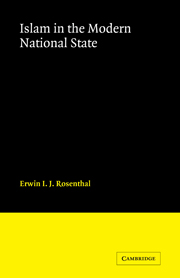Book contents
- Frontmatter
- Contents
- Introduction
- Acknowledgements
- Abbreviations
- Note on transliteration
- PART I CONTEMPORARY ISLAM IN CRISIS AND TRANSITION
- SECTION 1
- SECTION 2 ISLAMIC OR MODERN NATIONAL STATE?
- 3 Islam and Turkish Nationalism
- 4 For and against the Khilāfa
- 5 Islam and Arab Nationalism
- 6 An Islamic State for Pakistan?
- 7 Ἁllāl al-Fāsī: a Blend of Islam and Arab Nationalism
- PART II ISLAM IN THE MODERN NATIONAL STATE
- Epilogue
- Notes
- Select Bibliography
- Index
4 - For and against the Khilāfa
Published online by Cambridge University Press: 05 September 2013
- Frontmatter
- Contents
- Introduction
- Acknowledgements
- Abbreviations
- Note on transliteration
- PART I CONTEMPORARY ISLAM IN CRISIS AND TRANSITION
- SECTION 1
- SECTION 2 ISLAMIC OR MODERN NATIONAL STATE?
- 3 Islam and Turkish Nationalism
- 4 For and against the Khilāfa
- 5 Islam and Arab Nationalism
- 6 An Islamic State for Pakistan?
- 7 Ἁllāl al-Fāsī: a Blend of Islam and Arab Nationalism
- PART II ISLAM IN THE MODERN NATIONAL STATE
- Epilogue
- Notes
- Select Bibliography
- Index
Summary
It is obvious that modernity and modernisation affect in the first place political thinking and institutions, economic affairs, and such social questions as the position of women in contemporary society. If this society is Muslim, the legal status of woman and her participation in political and economic life are also involved. However we look at Islam, nobody can deny the central position of law in its structure and the important place it has in the divine plan as the guide to God and to man's happiness in the hereafter, but also—and this is significantly stressed in our time—his wellbeing in this world: in state and society.
ISLAM AND THE “MODERNIST” MOVEMENT IN EGYPT
The whole Muslim world watches with interest and anxiety the developments in Turkey, for what happens in one Muslim country is bound to have repercussions in most, if not all, of the others. Whether the reactions to movements and events in another part of the Muslim world are positive or negative, they reveal a natural concern of fellow Muslims even if the struggle for independent nation- and statehood demands their foremost attention.
This is especially true of Egypt, the cradle of the “modernist” movement under Muḥammad Ἁbduh and his disciple Rashīd Riḍā, and the scene of a prolonged fight for political independence from British occupation and for constitutional reform. For in Egypt, national and nationalist aspirations, represented by political organisations such as the Wafd, went hand in hand with the movement for religious reform and regeneration.
- Type
- Chapter
- Information
- Islam in the Modern National State , pp. 64 - 102Publisher: Cambridge University PressPrint publication year: 1965



